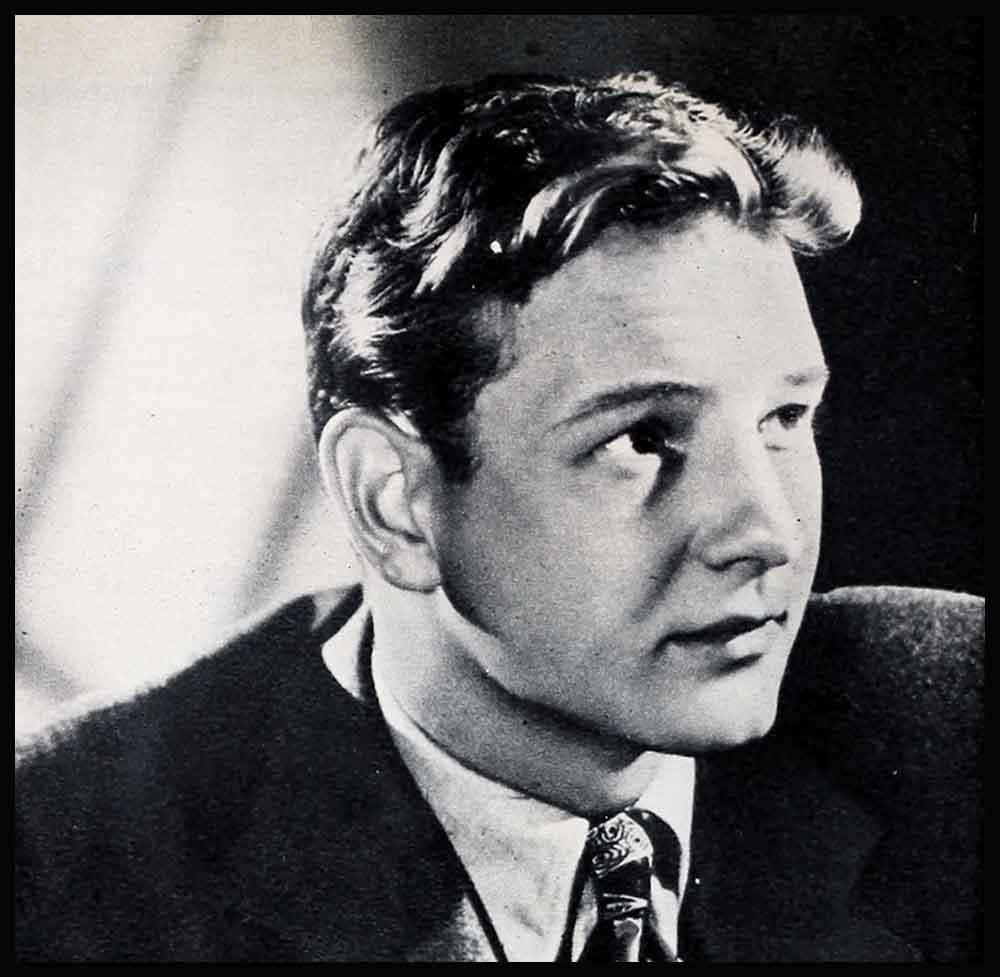
Moody Vagabond
Life is no longer just a bowl of oatmeal to Tom Drake. Today he can take it or leave it alone. And he leaves it alone.
In the kitchen of his comfortable sprawling stucco home with the red tile roof in Beverly Hills, oatmeal is conspicuously absent.
For at Metro Goldwyn Mayer—where clang, clang, clang went the trolley, the career of the dashing Drake has gone ding, ding, ding, on up to the top of the bell.
AUDIO BOOK
The wistful-eyed actor who grabbed off Gloria De Haven in “Two girls And A Sailor” and Judy Garland in “Meet Me In St. Louis,” is now grabbing off top billing along with Wallace Beery for his sensitive performance as the “yellow” flyer who makes good in “This Man’s Navy.”
His best pals insist that he would be still better at comedy. Feeling, no doubt, that anybody who can get a laugh out of oatmeal can get a laugh out of anything.
Well does Tom remember the many batches of the murky stuff brewed by himself, his sister Claire and the gang in his basement apartment during those first days on Broadway. Especially one time four days before payday—and how excited they all were, trying out somebody’s new recipe for glamorizing oatmeal. A dash of salt, a dash of margarine, another dash of something.
But four days is enough oatmeal. With or without salt.
Yet, even the way he tells it is indicative of the adventurous side of young Drake. And knowing him, you feel that no amount of fame’ can fence him in, that the kleigs and the glamour to him mean nothing, that he just wants to make a success of pictures to prove to himself that he can. And that once he does, he’s just as liable to take up raising race horses or deep-sea diving. And do equally well at both.
For Tom Drake is a creature of contrasts. A combine of opposites. The moody, serious Drake who wants to succeed and the gay adventurer who took a train to Hollywood the. way he used to take the local to New York from New Rochelle. And would take one back the same way. An eternal vagabond. The two Drakes are all mixed up like a chef’s salad inside.

He dreams of a ranch but never stays settled long enough to build a wigwam. He’s a sophisticated twenty-six and seems a more naive twenty-one. He looks like the harmless boy next door and has a deep sexy voice that hits you with the sock of a Charles Boyer. Behind that wistful face of his lurks a sense of humor that seldom stops at anything. He looks sad, but is very gay.
He gives the impression of just going along taking everything in his easy-going stride. Killing off one dragon at a time. And never counting anything until it hatches—which it usually does.
Though sometimes self-conscious with strangers, he lets loose with friends like an Abbott and Costello barrage.
His perpetually wistful look makes even landladies feel sorry for him. Which is probably why he got a house. It seems almost impossible that any guy could be so sad-eyed and such a zany inside. Moody vagabond. Orchids and oatmeal. Yowsah.
His sister and his pals all call him “Buddy,” which somehow seems to fit him much better than Tom.
He looks like the kind of a guy you picture going on a tramp steamer around the world.
Six feet tall, of husky athletic build, deeply tanned, with brown eyes and light brown hair, which he calls a “dirty blond.” The hair, true to form, runs in opposite directions too. There’s one wave that rises abruptly at his forehead and the rest goes completely smooth. He takes a lot of joshing about that one wave from Steve Brody and his other Hollywood pals—and has taken it since he was a kid back in New Rochelle.
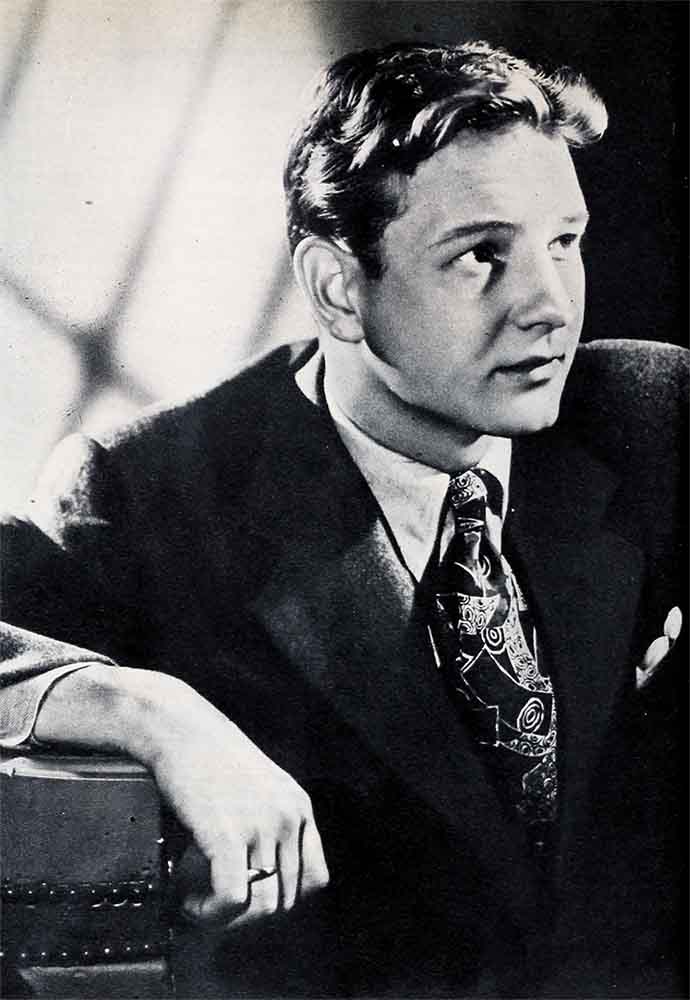
Born Alfred Alderdice Jr., the son of an English linen merchant, he spent all his early life just “forty-five minutes from Broadway” with his parents and his sister Claire.
It was in the back yard of his home that Tom’s career actually sprouted—when he struck poses and gave imitations of Gable, Laughton and Boyer—while the neighborhood kids and Claire applauded from their perches up in the trees.
Even as a child there was evidence of his will to succeed. At the tender age of nine he was sure he wanted to be a salesman. He had a little red wagon with a collie dog hitched to it, and would go down into the family cellar and pick out the best potatoes, load them into his cart, and take off up and down North Street peddling his mother’s best spuds.
His father’s pride in his initiative, coupled with a growing concern over the disappearing potatoes, caused him to go down to the local five and ten store and buy up five dollars worth of toothpaste, combs and stuff which he gave to Tom to sell on the Street. The neighbors admired his ambition and bought everything he had.
When the toothpaste gave out his dad wrote a publishing company and got Tom a job selling magazine subscriptions. Whenever he got tired making the rounds in his little wagon, his mother drove him around in the family limousine while he peddled them. He did a landslide business, eventually selling more subscriptions than anybody else in the U. S. And the publishing company sent a representative to New Rochelle to interview him and get a picture of him to put in the magazine.
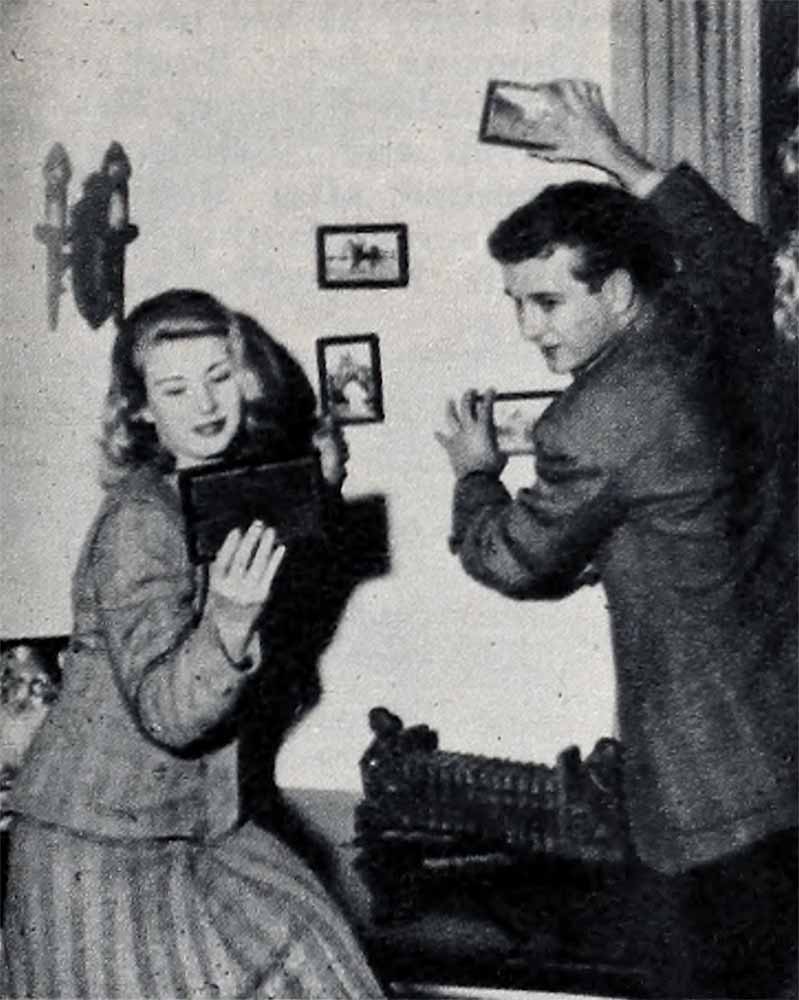
He made around $2000 for his share of subscriptions that Christmas and even five years later, at fourteen, was still getting $200 from renewals. But since his dad always made him give the money to the Salvation Army or some other worthy charity, it took all the fun out of it for Tom and squashed his ambitions forever to be a salesman.
It was after he graduated from Mercers-berg Academy in Pennsylvania that he decided to take a serious fling at acting. “By then I couldn’t think of anything else I was suited for and I figured I ought to be a success at something,” he says.
So he got a job in a stock company in Poughkeepsie that summer. Not long afterwards his mother (whom he fairly worshipped) died. His father had died a few years before. Leaving only Tom and Claire and his Great Dane Wrinkle.
Since Claire, too, aspired to an acting career, Tom loaded his pretty blonde sister and the Great Dane into his jalopy and away they went to try their luck on Broadway, and to try and find an apartment in New York.
Which wasn’t easy. None of the landlords shared Tom’s taste for Great Danes.
They finally found one in an old building on Riverside Drive around 78th Street that would take the dog.
The apartment wasn’t a walk-up, but more of a walk-down—or walk-in—if you dared. Very Sister Eileenish. One big, dismal room in the basement of the building, not far from the Hudson River, which they could seldom see for the barrage of bottles and rolling pins being tossed back and forth by the battling neighbors.
They painted it a sickly white, then decided to give it a modernistic touch by painting the woodwork a bright royal blue. It looked all right at night, but the next morning when they started moving their mother’s lovely mahogany furniture and rich oriental rugs in, it was pretty awful. Claire just sat down and cried. And Tom and Wrinkle looked mighty sad.
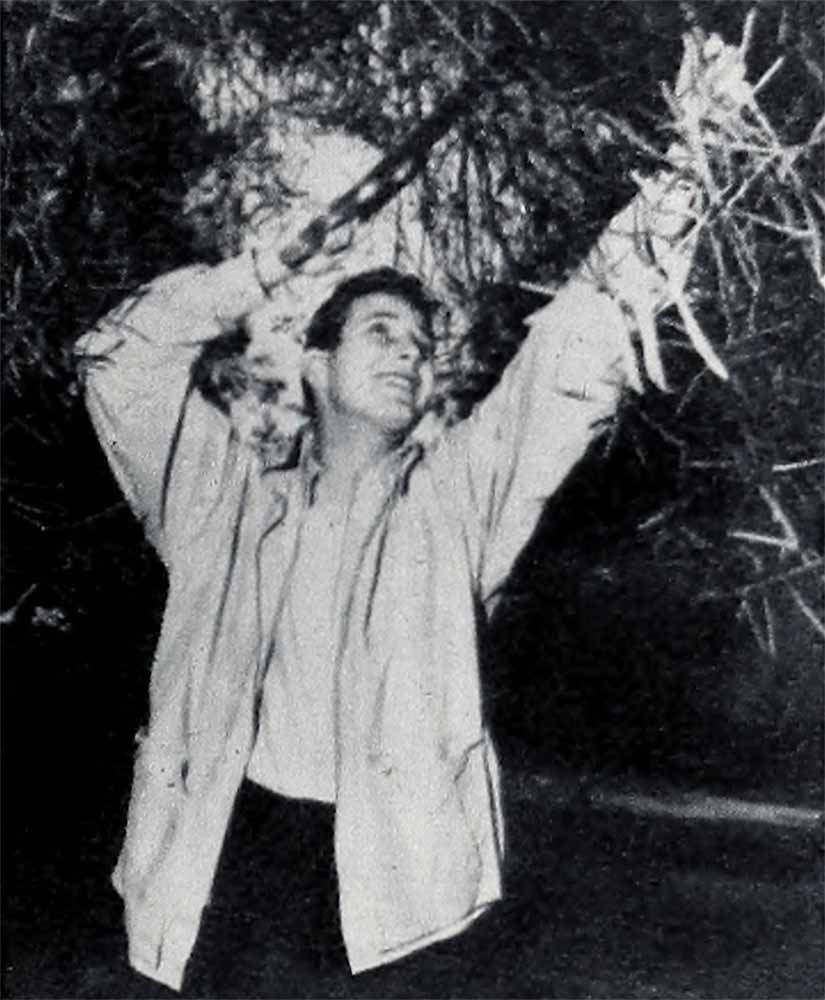
It was into this basement that there often crept the familiar aroma of oatmeal.
Tom finally got a role of the spear-carrying variety. It opened in Philadelphia and was a big flop. Two weeks later he was back home again staring at the royal blue woodwork with Wrinkle and Claire.
He has many funny memories of those first months in New York.
The time one of his old school friends (of wealthy vintage) came to visit them. How Claire had worked all day cleaning the basement so they could put on the best face possible. He’d just arrived when the neighbors started throwing bottles again. The funny surprised look on the boy’s face—when one crashed too near. . . .
Christmas Eve—when Buddy went crazy making soap-flake snowballs for their little tree—and put so many on it the tree fell over—and they walked around in “snow” up to their ankles for two days. . . .
The party they gave in the rooms they moved into at the Royalton Hotel when Tom got a small part and they felt they’d arrived. How the automatic record machine had gone haywire and started “dealing” records all over the room. Guests ducking. Hotel phone ringing. . . .
They way they both loved to move the furniture around when they were bored or blue. In two hours’ time Tom had changed everything. He’s a chronic furniture mover and the only reason he hasn’t changed his Beverly Hills living room is that the big piano is too heavy to move.
Between the furniture movings, Tom was playing brief engagements in “June Night” with Martha Scott, “Central Casting” with Esther Ralston, and in “Dance Night.” all very brief.
The next season he was in “Run, Sheep, Run” and “Clean Beds.” still brief. He signed for the son in “Tovarich” with Elissa Landi for a Rhode Island stock company. The next day he was called to try out for “Life With Father.” But he had to go to Rhode Island. Heartbreaking then, but he says now it was just as well. The way the hit is still running he’d have been living with “Father” all his life.
CHORTLY after that Tom came to California on a vacation. An agent took him over to M-G-M. “Uh-hm-hm—fine,” said the casting agent, “in about ten or fifteen years.” But another agent took him to see Director Frank Lloyd, who gave him the part of Cary Grant’s son in “The Howards Of Virginia.”

Tom says his performance in this film probably accounts more than anything else for the sad look he still wears now.
He went back to New York, but fast. Claire was now married to a young agent named Bob Kennedy. Tom moved into an apartment underneath theirs. And this time luck was with him. He landed the job in “Janie” that got him a contract with M-G-M. He arrived in Hollywood on a Monday, was tested for “Two girls And A Sailor” on Tuesday, and got the job the next day.
It’s been a fast trolley ride for him ever since.
His best pal is Corporal Mike Harvey, who was one of the cast of “Winged Victory,” worked in stock with Tom and shares the same uncontrollable sense of humor. When Mike was in Hollywood recently making the picture at Twentieth Century-Fox they dug many a laugh out of the past.
Tom had trouble finding his present home. He feels it was a sheer miracle that got him the lovely home he has now. It’s an informal Spanish-style stucco located near Gene Kelly’s home in Beverly Hills.
The woman who owns it, a very attractive, refined person about fifty-fivish, took one look at the dashing Drake and said she didn’t want any dogs, children, or women, especially not two women. “They never get along,” she said. Remembering the Grand Central turn-over in his New York apartment, Tom crossed his fingers and fibbed like a trouper. No dogs, no babies, no women, no nothin’.
Ruling the roost is Tom’s colored maid, Ellie Mae—who’s worth double her salary just to have her around for laughs.
The happiest times at the Drake “drive-in” are when his blonde sister comes out from New York to be sure he’s getting his laundry back okay. Bringing with her the two major women in Tom’s life, her baby daughter Casey, aged twenty months, and pretty four-and-a-half-year-old Chris, referred to by Tom as “Madame,” because it makes her so mad.
Tom himself is a conservative dresser. He likes gray lounge suits—or beige slacks with a brown sport coat, and has to be reminded to go buy any of them. But he’ll spend hours shopping for dresses for the kids and come home with some of the wildest twin outfits you’ve ever seen.
When Claire starts packing to go home he invariably puts an arm around Chris and Casey and wails, “You can’t take both of ’em. I won’t have an alarm clock left. I’ll never get up in time.”
Clocks are a phobia with him anyway. He hates to be pinned down to any time for social things, but is prompt to a “T” for business appointments.
Admittedly moody, he loves to just take off like a robot on cross-country trips (when you could take off like a robot on cross-country trips) with either Mike or Claire, driving for hundreds of miles without saying a word.
The only thing that really makes him mad is being pushed around. “Mentally pushed around,” he explains. People trying to shove ideas down his throat or make up his mind for him.
Very sentimental by nature, he has the greatest nostalgia for Christmas, his four-year-old red Buick convertible, or anything that means a lot of memories (including a pair of shoes which he’s had resoled for years because he thinks they’ve brought him luck). He has some lucky blue socks, too.
He likes to putter around on the piano in the lovely beige-toned living room and write songs, all of the tres torchy affairs.
He rarely gets hungry but loves to eat. . often ordering steak for breakfast and ham and eggs for supper, and has been known to start off with a cream puff and end up with roast beef.
He likes to dance but seldom goes to night clubs and usually has the gang in at home. He dislikes all kinds of cards because he hates to sit still.
Still unmarried, he has squired Judy Garland and other of Hollywood’s most popular gals, but usually goes with girls went through stock with or knew at that time. He likes girls with a sense of humor vitality, a pleasant disposition—and the capacity to either be talkative or quiet—when he himself wants to be talkative or quiet. He thinks beauty isn’t too important.
Tom says he’s never been “settled” in one place long enough to get married ‘I’m always moving on and the girls are always deciding on the other guy.”
Collecting pictures of thoroughbred horses is his pet hobby. He would like to raise race horses and Great Dane dogs neither of which he can very well do in a Beverly Hills back yard. With any land lady. No matter how wistful he looks.
He wanted terribly to get into service but a heart complication vetoed that. So in stead he wants”a ranch big enough to “wall around on” and to raise horses and dogs. Yet he admits that nothing fascinates him so much as a stretch of nice fresh high way winding to some place he’s never been before.
Well—there he is, the serious—and the vagabond. No matter how great his success . . . there’ll always be a sprinkle of oatmeal in his blood.
THE END
It is a quote. PHOTOPLAY MAGAZINE MARCH 1945
AUDIO BOOK


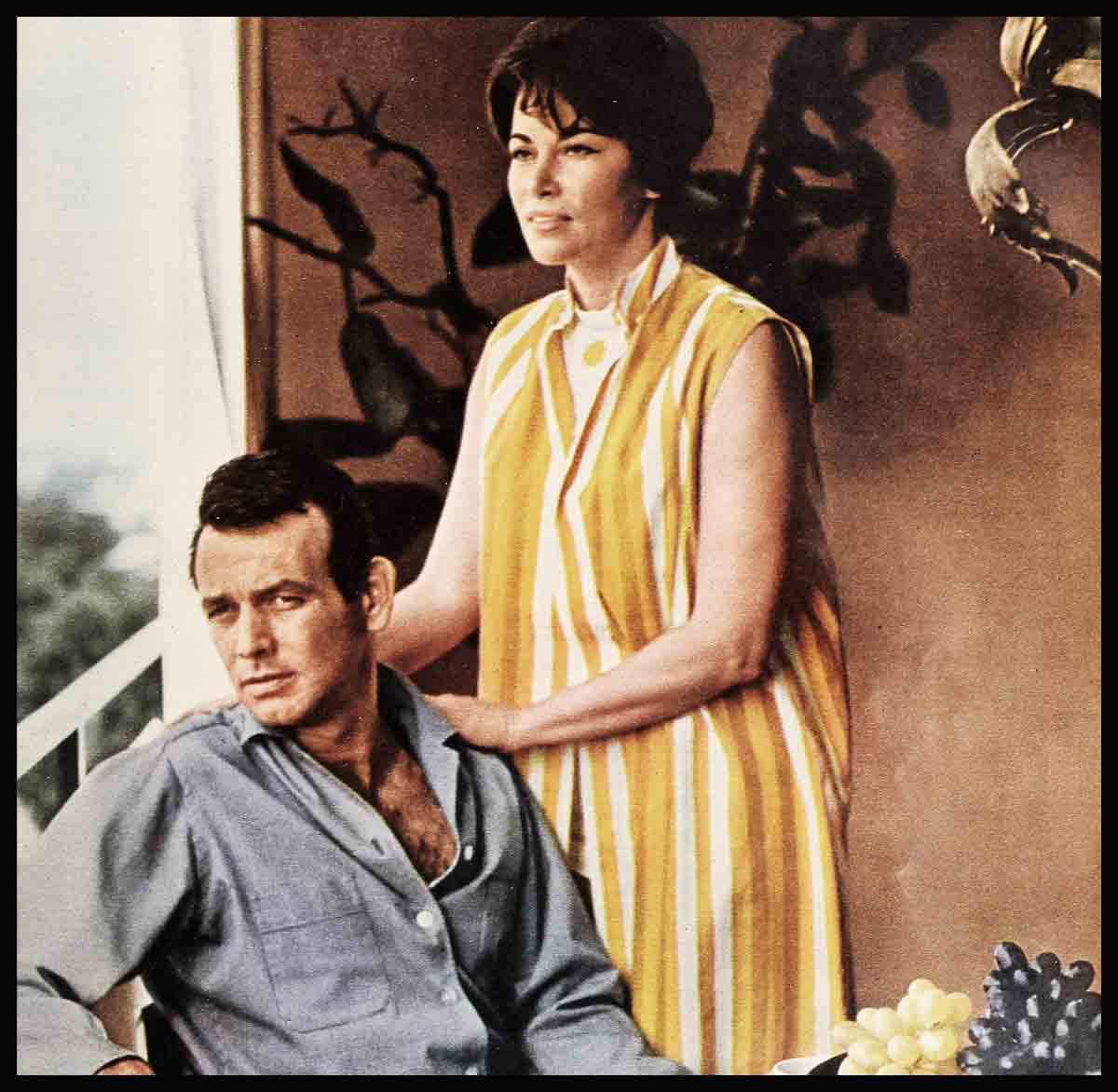

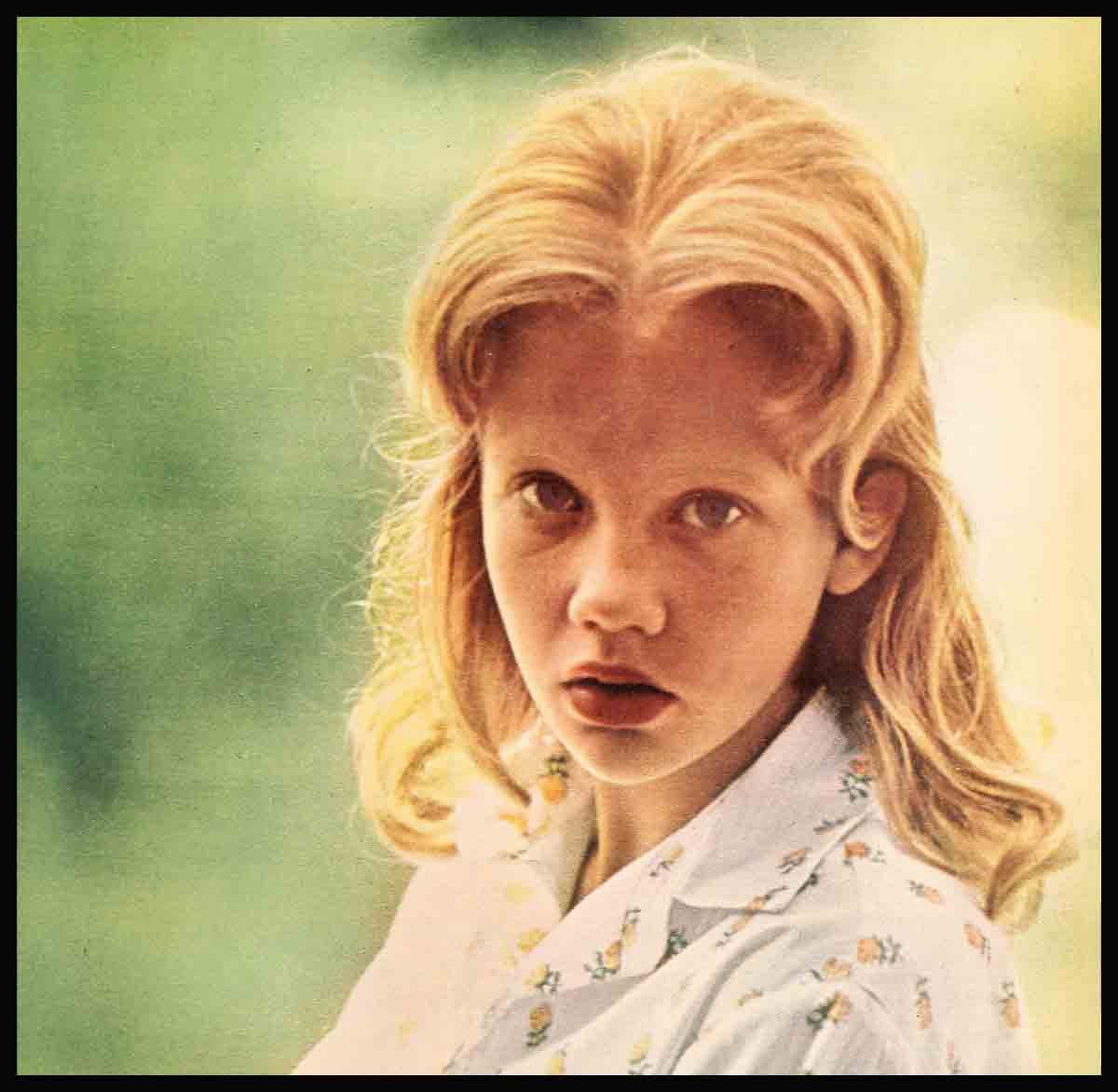
No Comments